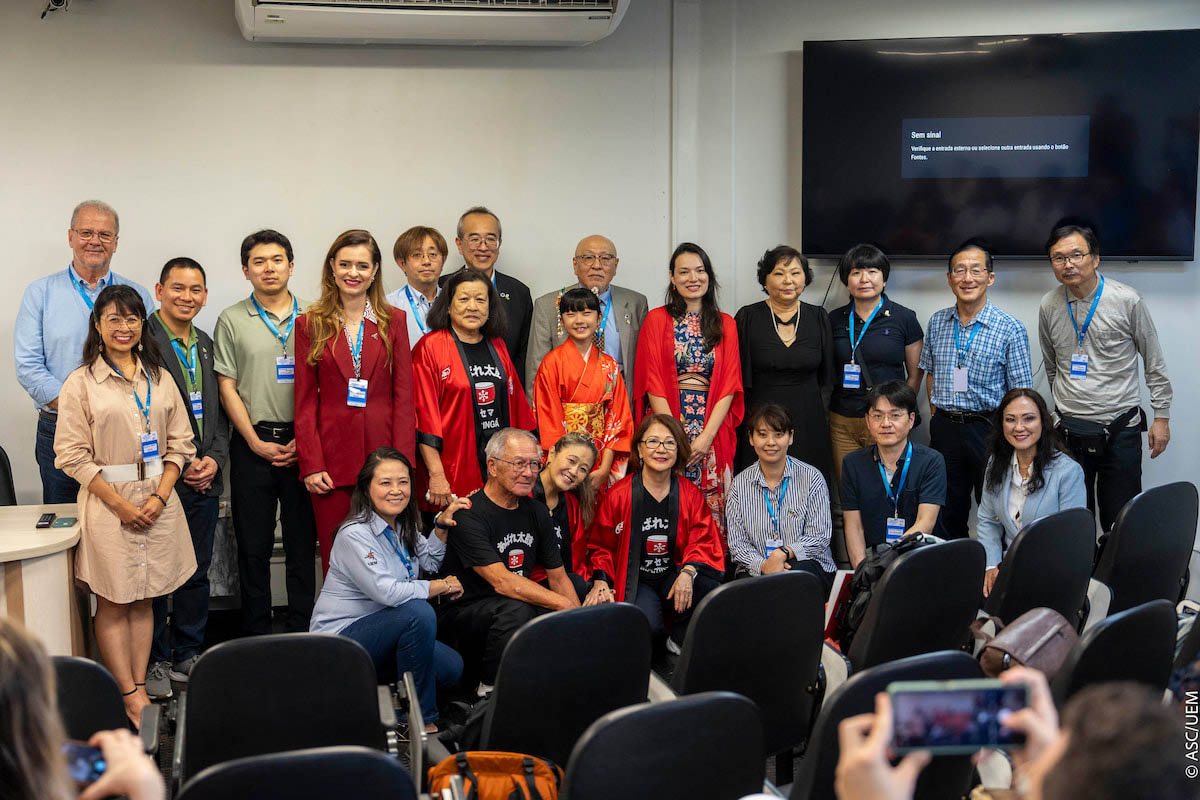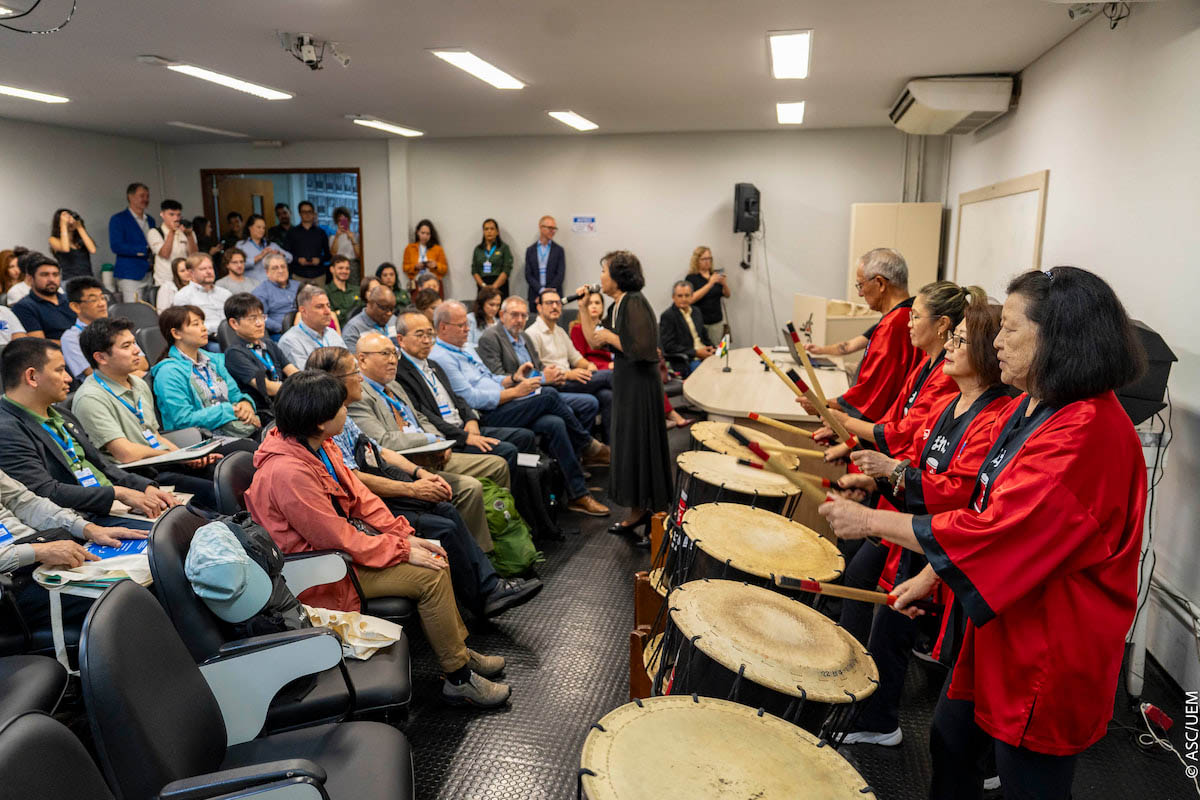Researchers from Japan and Paraná discuss scientific exchanges and partnerships in the area of food and agricultural technology
On Tuesday, March 18, the State University of Maringá (UEM-Universidade Estadual de Maringá) hosted a delegation of researchers and professors from universities in Japan and four State Higher Education Institutions (IEES-Instituições Estaduais de Ensino Superior) in Building J45. Organized by the Department of Science, Technology and Higher Education (Seti-Secretaria da Ciência, Tecnologia e Ensino Superior), the Araucária Foundation and the University of Tsukuba, the visit is part of an agenda that began on March 13, in Foz do Iguaçu, with visits to the state universities of Western Paraná (Unioeste-universidades estaduais do Oeste do Paraná), on the 17th; of Londrina (UEL-de Londrina), on the 19th; of Midwest (Unicentro-do Centro-Oeste), on the 20th; and of Ponta Grossa (UEPG), on the 21st.
The aim is to strengthen scientific cooperation between Paraná and Japan in the area of Agritech Food, including topics such as Agricultural Inputs and Economics, Animal and Plant Genetic Engineering, Agricultural Process Automation, Advanced Diagnostic Methods and Techniques for Animal and Plant Diseases and Functional Foods.
The event opened with a musical performance by the Abaredaiko group, from the Maringá Cultural and Sports Association (Acema-Associação Cultural e Esportiva de Maringá), which performed three traditional songs to the infectious sound of taikos (Japanese drums). Among the authorities at the ceremonial table were the vice-rector of UEM, Gisele Mendes; the pro-rector for Research and Graduate Affairs (PPG-Pesquisa e Pós-Graduação), Mauro Ravagnani; Seti's advisor for International Relations and International Cooperation, Paulo Afonso Schmidt; city councillor Akemi Nishimori; and the head of the delegation, researcher Kazuo Watanabe, from the University of Tsukuba.
The vice-rector stressed the importance of the Japanese delegation's visit to UEM, which is part of a tour of five of Paraná's seven state universities. "It's a very important visit for our university. They came precisely to learn about our research and foster this exchange between researchers here in Maringá and in Paraná," said Mendes.
The head of the Japanese delegation stressed his interest in strengthening academic and scientific cooperation between Japan and Paraná. According to him, the visit focuses on three main aspects: the exchange of students, the exchange of knowledge in the agricultural and environmental fields and the possibility of future collaboration between the countries. "We want to get to know each other's activities here. We also have various initiatives in Japan, applying studies and research to improve society, in areas such as agriculture, environmental conservation and food safety," said Watanabe. He also pointed out that there is an interest in understanding how agricultural production is carried out in Paraná and in promoting opportunities for Japanese students to get to know the local reality, as well as for Brazilians to experience Japanese culture and methods.
The PPG pro-rector believes that the visit represents a valuable opportunity to strengthen UEM's international cooperation. "This visit brings a perspective of collaboration that is very good for our institution's graduate programs. We have two programs that are highly rated nationally and it would be important to establish partnerships focused on innovation and research with the Japanese universities represented here," said Ravagnani.
The event was also attended by the coordinator of the International Cooperation Office (ECI-Escritório de Cooperação Internacional), Renato Leão Rego; the director of the College of Agricultural Sciences (CCA-Centro de Ciências Agrárias), Carlos Alberto de Bastos Andrade; and the member of the International Agreements sector of the ECI, Fabiano Burgo.
According to the ECI coordinator, this is an important initiative to promote the internationalization of various graduate programs at UEM. “The ECI is already working on cooperation agreements with the institutions involved,” said Leão.
Presentation of Research Field

During the meeting, the main fields of research and UEM's capacity to develop joint projects were presented, an aspect considered strategic for future collaborations.
The delegation was divided into two groups, according to the content presented in each of the amphitheaters in Building J45. In each room, researchers from the university presented their main lines of research to the Japanese visitors.
In Amphitheater 1, dedicated to Animal and Plant Genetic Engineering, Agricultural Inputs and Economics and Advanced Diagnostic Methods and Techniques for Animal and Plant Diseases, the following research was presented: “Precision livestock farming - tools for animal physiology and welfare”, with professor Sheila Tavares Nascimento; “Fusarium species and their mycotoxins in wheat and barley production in Paraná”, with professor Dauri José Tessmann; “Research and education in pet nutrition: food processing, ingredients and health in dogs and cats”, with professor Ricardo Vasconcellos; and “How do seed treatment and Bradyrhizobium inoculation affect soybean growth?”, with Professor Silas Maciel de Oliveira.
In Amphitheatre 2, with a focus on Functional Foods, the following research projects were highlighted: “Functional Foods and Alternative Proteins”, with Professor Paula Toshimi Matumoto Pintro; “Functional foods and natural extracts with antimicrobial action”, with Professor Magali Pozza; “Innovative foods for a sustainable future”, with Professor Grasiele Madrona; and “Probiotics for functionalizing products of plant origin”, with Professor Tatiana Pimentel.
In the afternoon, Japanese and Paraná researchers visited the laboratories of the Complex of Research Support Centers (Comcap/UEM-Complexo de Centrais de Apoio à Pesquisa).
Members of the delegation

In addition to researcher Watanabe (in the center of the back row), the Japanese delegation includes Professor Atsushi Asano, University of Tsukuba; the director of the Tsukuba Plant Innovation Research Center, Nayoya Fukuda; the representative of the Southeast Asia Liaison Office of the Japan International Research Center for Agricultural Sciences (Jircas), Norihito Kanamori; the assistant professor at the University of Tsukuba, Satoko Nonaka; technical officer at the Tsukuba Plant Innovation Research Center, Daisuke Otsubo; professor at Kagawa University; specialist in Food Chemistry and Flavor Chemistry, Hirotoshi Tamura; general manager of the Innovation Division of the Japan Association for Techno-innovation in Agriculture, Forestry and Fisheries (JATAFF), Akira Nagata; officer at the Bureau of Global Initiatives, Namiko Soya; and professor at the University of Tsukuba, Marlon Patalinhog Rivera.
The delegation also includes Brazilian researchers from state universities in Paraná. Present were Jackson Kawakami, from Unicentro; Ricardo Antonio Ayub, from UEPG; Sheila Tavares Nascimento and Paula Toshimi Matumoto Pintro, from UEM and Marcelo Giovanetti Canteri and Selwyn Arlington Headley, both from UEL.
Translation team:
Felipe Piva Amorim
Julia Pedriali Rosa

